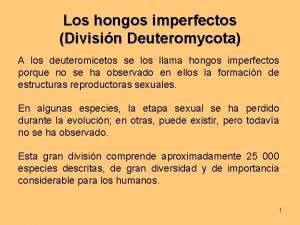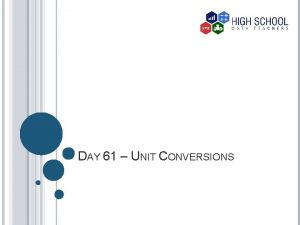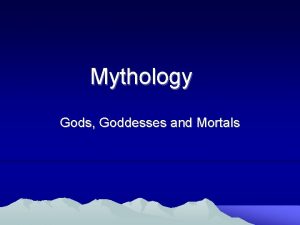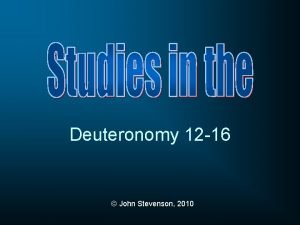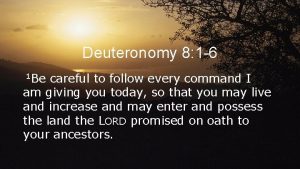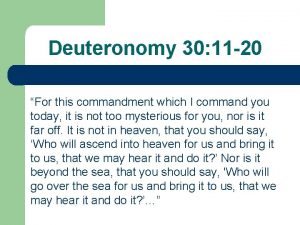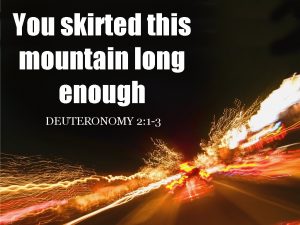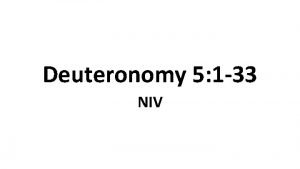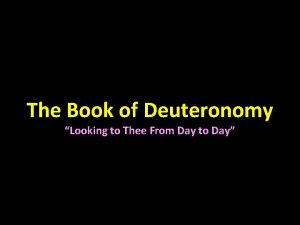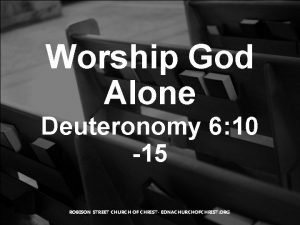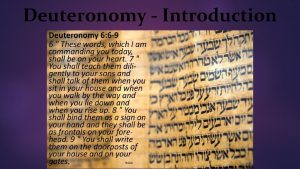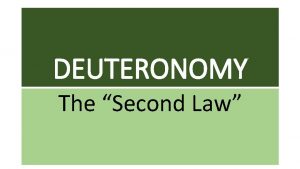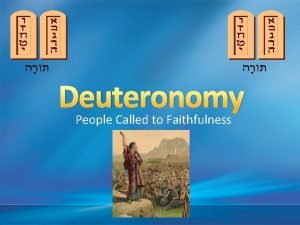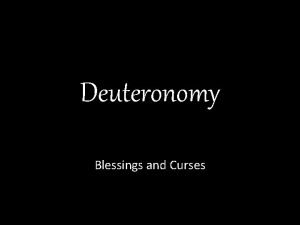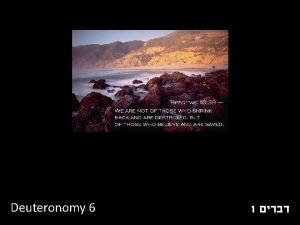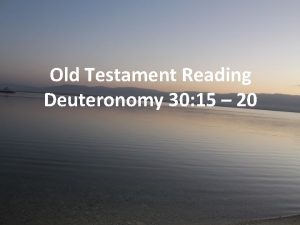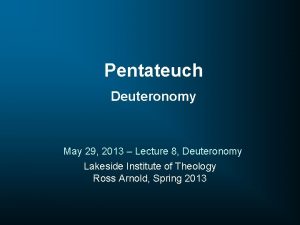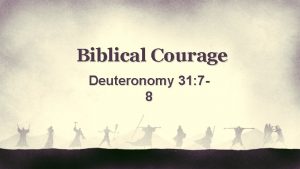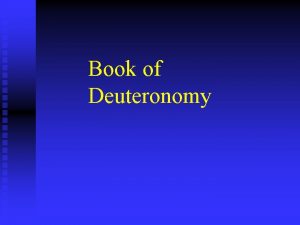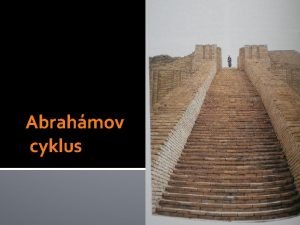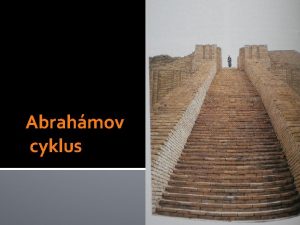Deuteronomy 1 16 In Greek Deutero second nomy
















- Slides: 16

Deuteronomy 1 -16 In Greek: Deutero = “second” nomy = “law” Deuteronomy then means “the second law” or “repetition of the law. ”

Moses was 120 years old when he wrote Deuteronomy is considered by many as the “gospel” of Moses. It was quoted more often by Old Testament Prophets than any other book of the Law (Torah). The long journey from Egypt to Canaan was over. Israel was about to enter the promised land but Moses would not go with them. Moses would give his last words to the children of Israel.

Deuteronomy can be divided up into three separate discourses from Moses: 1. Chapters 1 -4 Moses eloquently exhorted Israel to look to the laws given them by God so that they could enjoy God’s favor and protection in the future. It covered the events between Sinai and east of the Jordan River. 2. Chapters 5 -26 A review of the law, including the 10 Commandments. These chapters contain a description, explanation, and enforcement of the most essential contents of covenant relationships and laws. It covers the events of Sinai.

3. Chapters 27 -30 A call for Israel to renew the covenant and a warning of the consequences of failing to do so. It contains Moses final instructions relative to blessings and curses based on Israel’s behavior.

Deuteronomy 2: 7 “thou has lacked nothing” Alma 37: 44 It is easy to give heed to the word of Christ. Alma 37: 46 Do not let us be slothful because of the easiness of the way; for so was it with our fathers. Their situation adds poignant meaning to the phrase “so near, and yet so far. ”

Deuteronomy 4: 1 -8 “This reference only” Revelation 22: 18, Proverbs 30: 5, Deuteronomy 12: 32 These references indicate that any warning not to add to the things written refer only to the writings of that particular prophet.

President Brigham Young stated: “The saying which we have quoted, and which constitutes the sweeping argument of modern Christians against new revelation, only alludes to this particular book of Revelation, which was to be kept sacred, as the word of the Lord to John, and not to the whole Bible; nor does it prohibit the Saints in his day, or the Saints in any future time, from getting new revelation for themselves. That is not all; if we turn to the writings of Moses, we find the same sentiment and almost the same language used.

Moses says, ‘Ye shall not add unto the word which I command you, neither shall ye diminish ought from it, that ye may keep the commandments of the Lord your God which I command you. ’ So if such quotations are given with the intent to shut the heavens, and put an end to all new revelation, then the revelations given to Prophets who arose after Moses, and the revelations given to Jesus Christ and his Apostles, including John and his revelations on the Isle of Patmos, all amount to nothing, and are not worthy of our notice. The ‘sweeping argument, ’ when it is examined, sweeps away rather too much; besides, John’s Gospel and his epistle to his brethren were written after he wrote his revelation on the Isle of Patmos, consequently he would destroy his own system; but it sets forth the ignorance and short-sightedness of those who have not the testimony of Jesus, which is the spirit of prophecy” (Journal of Discourses, 1: 242 -43).

Deuteronomy 4: 9 “teach thy sons, and thy sons’ sons” Doctrine & Covenants 68: 25 -30 “Eight things to teach your children” President Benson’s talk: “What I hope you will teach your children about the temple” (Ensign, 1985, 7 -10).

Deuteronomy 6: 4 -9 the “Shemna” Pronounced “shma” Began what was known among Jewish people as the “Shemna. ” The Shemna was in Jewish thought supreme affirmation of the unity of God and was frequently called the acceptance of the yoke of the Kingdom of Heaven. The entire Shemna, which consist of Deuteronomy 6: 4 -9, Deuteronomy 11: 13 -21 and Numbers 15: 37 -41 was recited twice daily by all devout Jews as an evening and a morning prayer. It has become traditional for Jewish martyrs to face death with the Shemna on their lips. Shemna in Hebrew is to “hear. ” Verses 4 -7 of Deuteronomy 6 were kept inside of phylacteries.



President Ezra Taft Benson said that people who are “captained by Christ will be consumed in Christ…. Enter their homes, and the pictures on their walls, the books on their shelves, the music in the air, their words and acts reveal them as Christians” (Conference Report, Oct. 1985, 6). President Brigham Young said: “The worst fear I have about members of the Church is that they will get rich in this country, forget God and his people, wax fat, and kick themselves out of the Church and go to hell. This people will stand mobbing, robbing, poverty, and all manner of persecution, and be true. But my greater fear for them is that they cannot stand wealth; and yet they have to be tried with riches, for they will become the richest people on this earth” (Preston Nibley, Brigham Young: The Man and His Work [1936], 128).

Deuteronomy 7: 1 -5 God sentenced seven nations of Canaan to death and Israel was to be the executioner I Nephi 4: 13 Behold the Lord slayeth the wicked to bring forth his righteous purposes. It is better that one man should perish than that a nation should dwindle and perish in unbelief. Prostitution and homosexuality had become religious practices to the point where the people were entrenched in depravity and proud of it. Their iniquity was “full” or total. They were ripe in iniquity (I Nephi 17: 35).

Deuteronomy 6: 16, 8: 3 “Sound familiar? ” These are the scriptures that the Savior quoted in reply to Satan’s temptations on the Mount of Temptation. Ye shall not tempt the Lord your God (Matthew 4: 7). Man doth not live by bread only, but by every word that proceedeth out of the mouth of the Lord doth man live (Matthew 4: 4).

Deuteronomy 8: 4 “Remarkable durability” Israel had limited means for producing some items of clothing. Deuteronomy 9 (Chapter heading) On two occasions Moses has gone without food and water forty days!
 Que son los hongos deuteromicetos
Que son los hongos deuteromicetos 186 282 miles per second into meters per second
186 282 miles per second into meters per second What is the greek miracle in greek mythology
What is the greek miracle in greek mythology What does the lord require of you deuteronomy
What does the lord require of you deuteronomy Deuteronomy 13:12-16
Deuteronomy 13:12-16 Cosmic geography
Cosmic geography Deuteronomy 8:1-6
Deuteronomy 8:1-6 Major prophets
Major prophets Deuteronomy 30:11-20
Deuteronomy 30:11-20 You have been at this mountain long enough
You have been at this mountain long enough Deuteronomy 7:14
Deuteronomy 7:14 The 10 commandments niv
The 10 commandments niv Deuteronomy 27:1-8
Deuteronomy 27:1-8 Deuteronomy 20:8
Deuteronomy 20:8 Deuteronomy 7:9 nkjv
Deuteronomy 7:9 nkjv Deuteronomy 5:19
Deuteronomy 5:19 Deuteronomy 6:14-15
Deuteronomy 6:14-15
